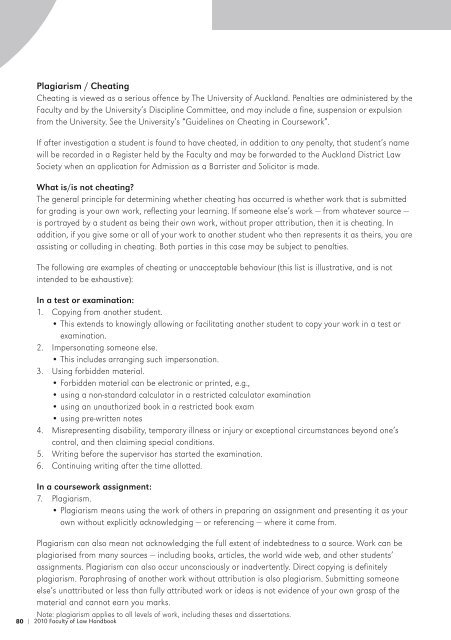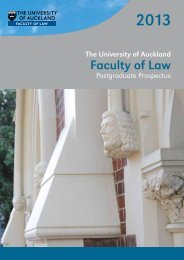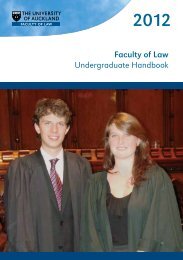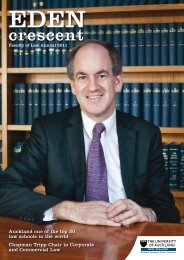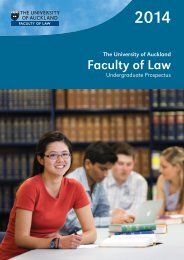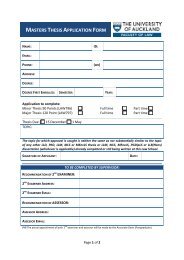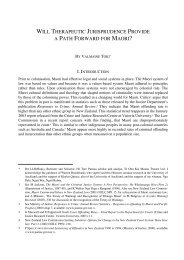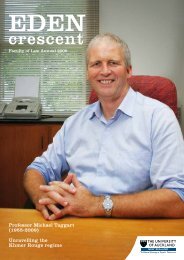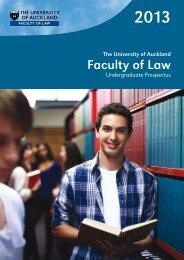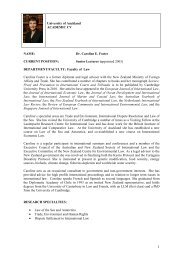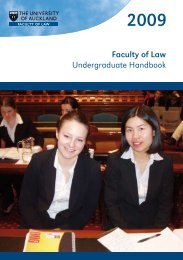Faculty of Law Undergraduate Handbook - Faculty of Law - The ...
Faculty of Law Undergraduate Handbook - Faculty of Law - The ...
Faculty of Law Undergraduate Handbook - Faculty of Law - The ...
- No tags were found...
Create successful ePaper yourself
Turn your PDF publications into a flip-book with our unique Google optimized e-Paper software.
Plagiarism / CheatingCheating is viewed as a serious <strong>of</strong>fence by <strong>The</strong> University <strong>of</strong> Auckland. Penalties are administered by the<strong>Faculty</strong> and by the University’s Discipline Committee, and may include a fine, suspension or expulsionfrom the University. See the University’s “Guidelines on Cheating in Coursework”.If after investigation a student is found to have cheated, in addition to any penalty, that student’s namewill be recorded in a Register held by the <strong>Faculty</strong> and may be forwarded to the Auckland District <strong>Law</strong>Society when an application for Admission as a Barrister and Solicitor is made.What is/is not cheating?<strong>The</strong> general principle for determining whether cheating has occurred is whether work that is submittedfor grading is your own work, reflecting your learning. If someone else’s work — from whatever source —is portrayed by a student as being their own work, without proper attribution, then it is cheating. Inaddition, if you give some or all <strong>of</strong> your work to another student who then represents it as theirs, you areassisting or colluding in cheating. Both parties in this case may be subject to penalties.<strong>The</strong> following are examples <strong>of</strong> cheating or unacceptable behaviour (this list is illustrative, and is notintended to be exhaustive):In a test or examination:1. Copying from another student.• This extends to knowingly allowing or facilitating another student to copy your work in a test orexamination.2. Impersonating someone else.• This includes arranging such impersonation.3. Using forbidden material.• Forbidden material can be electronic or printed, e.g.,• using a non-standard calculator in a restricted calculator examination• using an unauthorized book in a restricted book exam• using pre-written notes4. Misrepresenting disability, temporary illness or injury or exceptional circumstances beyond one’scontrol, and then claiming special conditions.5. Writing before the supervisor has started the examination.6. Continuing writing after the time allotted.In a coursework assignment:7. Plagiarism.• Plagiarism means using the work <strong>of</strong> others in preparing an assignment and presenting it as yourown without explicitly acknowledging — or referencing — where it came from.Plagiarism can also mean not acknowledging the full extent <strong>of</strong> indebtedness to a source. Work can beplagiarised from many sources — including books, articles, the world wide web, and other students’assignments. Plagiarism can also occur unconsciously or inadvertently. Direct copying is definitelyplagiarism. Paraphrasing <strong>of</strong> another work without attribution is also plagiarism. Submitting someoneelse’s unattributed or less than fully attributed work or ideas is not evidence <strong>of</strong> your own grasp <strong>of</strong> thematerial and cannot earn you marks.Note: plagiarism applies to all levels <strong>of</strong> work, including theses and dissertations.80 | 2010 <strong>Faculty</strong> <strong>of</strong> <strong>Law</strong> <strong>Handbook</strong>


